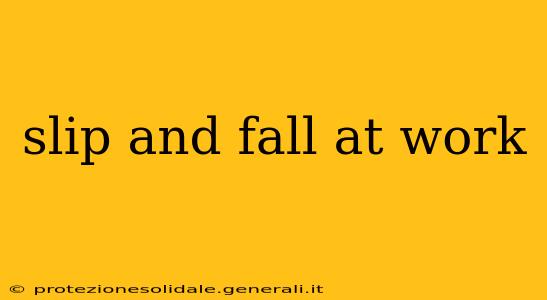Slip and fall accidents at work are unfortunately common, resulting in injuries ranging from minor bruises to severe fractures and head trauma. Understanding your rights, responsibilities, and the steps to take after such an incident is crucial. This comprehensive guide will equip you with the knowledge to navigate this challenging situation effectively.
What to Do Immediately After a Slip and Fall at Work?
The immediate aftermath of a slip and fall is critical. Your actions in these initial moments can significantly impact your legal recourse and recovery.
- Seek Medical Attention: Even if your injuries seem minor, seek medical attention immediately. Document all injuries, no matter how seemingly insignificant. A seemingly minor injury can worsen over time. The medical records will serve as crucial evidence later.
- Report the Incident: Report the incident to your supervisor or a designated person within your company immediately. Follow your company's established reporting procedures. Obtain a copy of the incident report.
- Document the Scene: If possible and safe, take photographs or videos of the location where the fall occurred. This includes the hazardous condition that caused the fall (e.g., spilled liquid, uneven pavement, inadequate lighting). Note the time, date, and weather conditions. If witnesses are present, obtain their contact information.
- Do Not Admit Fault: Avoid admitting fault or apologizing for the incident. Focus on documenting facts.
- Keep Records: Preserve all relevant documentation including medical bills, doctor's notes, lost wages statements, and photographs.
What are the Common Causes of Slip and Fall Accidents at Work?
Understanding the common causes can help prevent future incidents and strengthen your claim.
- Spilled Liquids: Spills are a leading cause of slip and fall accidents. This includes water, oil, grease, and other substances.
- Wet Floors: Poorly maintained floors, especially in areas with frequent cleaning, can contribute to slips.
- Uneven Surfaces: Cracks, holes, or uneven pavement can cause unexpected trips and falls.
- Poor Lighting: Inadequate lighting can make hazards harder to see, increasing the risk of falls.
- Obstructions: Cords, boxes, or other objects left in walkways can create tripping hazards.
- Improper Footwear: Wearing unsuitable footwear for the work environment can increase the risk of slips.
How Do I File a Workers' Compensation Claim After a Slip and Fall?
Workers' compensation is designed to protect employees injured on the job. Filing a claim typically involves these steps:
- Notify Your Employer: Your employer should already be aware of the incident from your initial report. However, confirm that they received your report and ensure they are processing your claim accordingly.
- Seek Medical Treatment: Continue to follow your doctor's orders and attend all scheduled appointments.
- Complete Necessary Forms: Your employer or their insurer will provide the necessary paperwork for a workers' compensation claim. Complete the forms accurately and promptly.
- Follow Up: Regularly follow up on the status of your claim with your employer and the insurer.
What if My Employer is Not Cooperating with My Workers' Compensation Claim?
If your employer is not cooperating or is delaying your claim, you have options. Consult with a workers' compensation attorney to discuss your rights and explore legal options.
Can I Sue My Employer After a Slip and Fall at Work?
In most cases, workers' compensation is the exclusive remedy for workplace injuries. This means you typically cannot sue your employer directly. However, there might be exceptions, such as if the employer intentionally caused the injury or acted with gross negligence. This is a complex area of law, and consultation with a legal professional is crucial.
What Compensation Can I Receive for a Slip and Fall at Work?
Compensation under workers' compensation typically covers medical expenses, lost wages, and potentially other benefits depending on the severity of the injury and the state's laws. The specifics vary from state to state.
How Long Does it Take to Settle a Slip and Fall Workers' Compensation Claim?
The time it takes to settle a workers' compensation claim varies significantly depending on factors such as the severity of the injury, the complexity of the case, and the cooperation of all parties involved. In some cases, it can be settled relatively quickly; in others, it can take months or even years.
This information is for general guidance only and does not constitute legal advice. It's vital to consult with a qualified legal professional for advice tailored to your specific situation. The laws governing workplace accidents and workers' compensation vary by jurisdiction.
